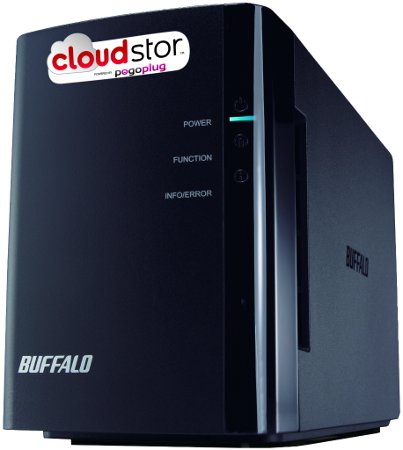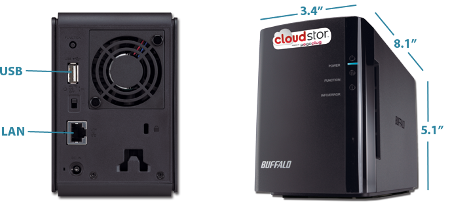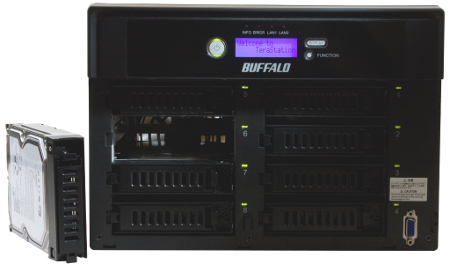Buffalo launches first Pogoplug device with internal storage
Jan 14, 2011 — by Eric Brown — from the LinuxDevices Archive — 1 viewsBuffalo Technology announced a web-accessible “Buffalo CloudStor” networked-attached storage (NAS) device for home users with up to 2TB of storage, based on Cloud Engines' Linux-driven Pogoplug device. The company also announced a new series of “TeraStation Pro” NAS devices for small businesses that can scale from 4TB up to 24TB and run on a dual-core Intel Atom D510 processor.
In June 2009, Buffalo, D-Link, LaCie, and Seagate announced they would launch retail versions of Marvell's Linux-based 1.2GHz, five-Watt Plug Computer reference design. Earlier hardware licensees of the Plug Computer included Cloud Engines, whose Pogoplug went on to become arguably the most popular of the Plug Computer devices, and was recently updated in a Wi-Fi-enabled Pogoplug Pro version.
Now, Buffalo says it has based its new CloudStor device on the PogoPlug software. CloudStor is the first Pogoplug device with integrated hard disk drive storage, as opposed to the PogoPlug's attached USB-accessible storage.

Buffalo CloudStor
(Click to enlarge)
The processor was not listed, but it would appear that the CloudStor uses the same 1.2GHz Marvell 88F6000 ("Kirkwood") system-on-chip (SoC) used by the Pogoplug Pro, as well as by Marvell's original Plug Computer design. (A year ago, Marvell announced it was developing a 2GHz Plug Computer 3.0 design.)
Like the Pogoplug, the CloudStor interacts with a cloud-based portal, which provides for remote web access to local storage. Users can access and share photos, videos, and music "with anyone, anywhere through the cloud," says Buffalo. The company is offering CloudStor users a free account at its own Pogoplug-based "mycloudstor.com" service.
No content actually resides in the cloud, thereby making CloudStor more secure, says Buffalo. Users own and store their files locally, and decide what they want to share.
Whether accessing the device at home or remotely, the CloudStor appears like a hard drive onscreen, accessible via a drive letter on PCs and as a device through the Finder on Mac computers, says the company. CloudStor is also said to be accessible via Pogoplug apps on mobile devices, as well as via Facebook and Twitter.

CloudStor, back and front
(Click to enlarge)
Stated Daniel Putterman, CEO of Cloud Engines, "Buffalo's CloudStor is the first Pogoplug device with integrated storage, and coupled with the easy-to-use interface, consumers now have an out-of-box ready Pogoplug storage solution that is free of service and data fees."
Stated Ralph Spagnola, vice president of sales at Buffalo Technology, "Buffalo's CloudStor delivers on the promise of data mobility and allows your content to be shared freely with anyone, anywhere."
Buffalo's Atom-D510-based TeraStation Pro
Buffalo Technology also announced a new line of relatively low-cost, desktop and rack-mount NAS systems, reports Chris Preimesberger in our sister publication eWEEK. Buffalo's TeraStation Pro storage packages, aimed at small and midsize businesses and home offices, are comprised of the TeraStation Pro Duo, Pro Quad, Pro Rackmount, Pro 6, and Pro 8 units.

TeraStation Pro 8
(Click to enlarge)
TeraStation Pro devices can scale from 4TB up to a maximum capacity of 24TB. The TeraStation Pro 8 (pictured above), for example, features eight bays of storage ranging from 8TB to 24TB. The Pro 8 offers RAID 6, as well as support for RAID 0/1/5/10 modes.
TeraStation units are also available in six-bay, four-bay, and two-bay configurations. The systems feature dual gigabit Ethernet ports, hot-swap hard drives, disk quota support, and data replication with device failover, says the story. Active Directory support is available, as are 10 licenses of NovaBackup Business Essentials software for backup.
Linux was not listed in the specs, as far as we could see, but like most NAS vendors, Buffalo has long used the operating system to drive its devices.
In July 2009, Melco Holdings, the parent company of Buffalo Inc. and Buffalo Group, signed a patent covenant deal with Microsoft to receive patent indemnity coverage for Buffalo's Linux-based NAS and router equipment. Buffalo joined a growing list of embedded Linux vendors that have settled with Microsoft over the latter's patent claims.
Availability
The Buffalo CloudStor will be available in February at an estimated street price of $170 for the 1TB CloudStor (CS-WX1.0TL) and $270 for the 2TB CloudStor Pro (CS-WV2.0TL). More information on the CloudStor may be found at Buffalo's CloudStor site.
The TeraStation Pro systems will become available starting in February. The Pro 8 system will sell for $3,000 for the 8TB version, $5,000 for the 16TB edition, and $6,500 for the 24TB package. The six-bay, four-bay and two-bay versions range from 4TB to 12TB in capacity and from $800 to $5,000 in price. More on the new TeraStation Pro storage devices may be found at this Buffalo CES page.
This article was originally published on LinuxDevices.com and has been donated to the open source community by QuinStreet Inc. Please visit LinuxToday.com for up-to-date news and articles about Linux and open source.